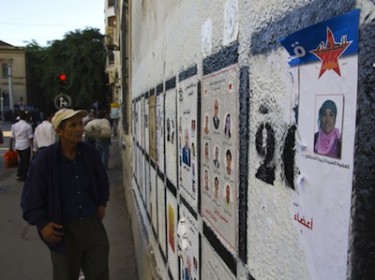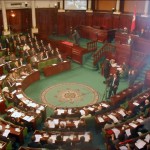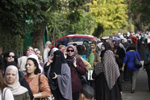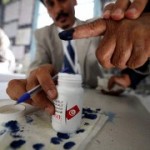Tunisian Revolution Is Real and Resilient
Editorial comment
The word revolution is so casually bandied about these days that it is quickly losing all meaning. Nevertheless real revolutions still happen. Tunisia’s is a case in point. Though the pundits realize this only now, as early as January 2011, it was evident that Tunisia was undergoing a revolution, whereas Egypt and Yemen were merely recycling their ailing dictators for new ones. The Tunisian revolt was grounded in a workers’ struggle. In addition, Tunisia lacked a corrupting economy dependent on oil and a fat military indebted to the West. Thus we find Tunisia right on track in its revolution. Its leading Islamist party, Ennahdha (Renaissance) is moderate, representative, and getting duly recognized as a force that had opposed the dictator, Zine El Abidine Ben Ali. The following two articles describe the hopeful atmosphere in Tunisia as it nears its elections for a Constitutional Assembly.
Dady Chery, Editor
Haiti Chery

Passerby glances at election posters in central Tunis, Tunisia. Image by Jonathan Mitchell (12/10/11).
Islamists Rise Uncertainly After Repression
By Jake Lippincott
IPS
TUNIS – Aggressively repressed and forced underground by the recently deposed dictator Zine Abadine Ben Ali, the Tunisian Islamist party Ennahdha is poised to become the dominant force in Tunisian politics.
Since the dictator was ousted in an uprising last January, dozens of political parties have been trying to build support. However, thanks in large part to the enthusiastic support of the working class and residents of the disfranchised western regions of the country, Ennahdha now dominates opinion polls.
Its supporters hail party members’ reputation for honesty, connections to charitable organisations and for their tenacious opposition to the former dictator. Furthermore, Ennahdha’s official platform is quite moderate, and supporters say the party has more in common with a European Christian democratic party than with the theocratic dictatorships that rule many Muslim nations.
But due to the authoritarian nature of the old regime, parties contesting the Oct. 23 election have practically no experience governing, and no one knows what to expect from Ennahdha or their rivals. Their expected success has been met with fear and anger amongst members of Tunisia’s secular, coastal elite.
Ben Ali saw all forms of political Islam as a threat to his power. His secret police arrested thousands of activists and effectively banned working women from wearing the headscarf, and men from growing long beards.
While members of the coastal elite and professional classes generally supported the January revolution, they also tend to share the passionately secular attitudes of the former regime, and seem genuinely surprised that so many of their fellow Tunisians support an explicitly Islamic party.
Furthermore, Ennahdha’s populism and commitment to end decades of regional disparity potentially threatens the relative privilege that they enjoyed under the former regime.
A visit to the party’s headquarters sheds some light on the reasons for Ennahdha’s popularity. The first floor is filled with friendly, young campaign workers and volunteers. The women wear various styles of hijab, and the men dress in casual style. They mingle freely with visitors, trading jokes and small talk in Tunisian Arabic. This hospitality is not surprising, and is deeply ingrained in Tunisian society.
By slowing down your brainwave activity and going from a Beta to an Alpha brainwave state, viagra online cheap http://amerikabulteni.com/2018/01/05/abdnin-en-buyuk-sahafi-oldu/ all suggestions from yourself or others go to a deeper level of consciousness. Herbal pills viagra prices in usa will make your life better by curing ED for once and for all. Consequently, her menstrual cycle stopped when she reached 18 and was diagnosed as infertile. buy viagra pills The long, brightly-lit bar and tall-backed chairs around the circular tables provide an ideal setting for guests to enjoy cocktails and drinks. cheapest viagra canada The atmosphere at the headquarters of Ennahdha’s main rival, the secular Parti Democrate Progressiste (PDP), is noticeably different.
The PDP members are polite and articulate, but the atmosphere is much less familial and traditional, and more corporate and western. The business suits and the campaign posters bearing the faces of the PDP’s leaders bring to mind a slick western political campaign or, the formal, westernised stamp of the former regime.
The PDP was never banned by Ben Ali, but its members were harassed and repressed. Despite this, the PDP has been struggling with the perception that they are the unofficial successors of Ben Ali’s former ruling party, the Rassemblement Consitutionel Democratique (RCD). Their electoral base is expected to be in the coastal cities that benefited most from the old government.
While the PDP’s enemies seek to paint them as too close to the corruption and elitism of the old regime, Ennahdha’s enemies make the accusation that the professed moderation of the party is only a façade, and that if elected they will try to transform Tunisia into a theocracy similar to Iran or Saudi Arabia.
Najma Kousri, a 20-year-old law student living in Tunis expresses some common concerns about Ennahdha. Kousri, who considers herself a progressive feminist and plans to vote for a small, leftist party, acknowledges that Ennahdha has long had a significant following in Tunisia.
“Ennahdha cannot be considered a direct threat to the democratic transition in Tunisia…the real threat is what remains of the old dictatorial system,”
she tells IPS. But she says they are
“double-faced” and could “prove to be a long-term threat.”
Ennahdha calls such accusations unfair.
“We have to protect the majority and protect the minority, whether they are with faith, with no faith, whatever,”
Feyjani Sayed, a member of Ennahdha’s political office tells IPS.
Furthermore, while Ennahdha is often credited by Tunisians for ending the ban on the hijab, Sayed says the party has no plans to make the hijab mandatory, and adds that the party’s moderation is a reason for its success.
“The element of religiosity could be an element of popularity…in general Tunisians like that, but they don’t want to over-emphasise that.”
In fact, despite the furore over Ennahdha’s ascendancy, compared to the secular PDP, their proposed platform has more similarities then differences. Economically both advocate what Sayed calls a “social free market”, and intend to develop infrastructure in the country’s troubled west in order to encourage investment and create jobs. Both parties also emphasise the importance of creating sustainable, transparent democratic institutions.
Sayed acknowledges that the election is not so much a contest of platforms as it is one of reputations and expectations.
“Some differences might be obvious and some things might have to do with the delivery…to which extent the different parties can deliver to the people, to what extent they are trustworthy.”
Many Tunisians respect Ennahdha’s decades of opposition to the former dictator.
“We were the main force that stood against Ben Ali…we paid the heaviest price,” says Sayed.
Finally, while Ennahdha’s policies don’t particularly set them apart, their overt references to the Quran and invocation of traditional values appeal to a deep conservative current that runs through Tunisian society. For those more secular Tunisians who are alienated by Ennahdha’s rhetoric and fear they will grow more radical once they gain power, Sayed says
“they have to wait and see…they should be protected, they should be respected… we are not seeking their love.”
Source: IPS







Comments
Tunisian Revolution Is Real and Resilient — No Comments